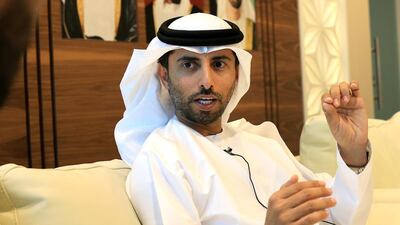Suhail Al Mazrouei, the Minister of Energy, explains that the UAE is not comparing itself to the region any more. ‘We are aspiring to build one of the strongest economies in the region’.
Q: What is going to happen to fuel prices after August 1?
A: Our studies show that the price of diesel will come down and this is good news for consumers because diesel affects everything that we use everyday, all the commodities that we buy except our cars, our personal cars that take us to work. The equation has to be balanced. When we looked at the price of petrol, it was regulated and fixed and that encouraged lots of misuse of that commodity. Now, with the international prices where they are today and where we are on regulated prices, they are not so far apart so there will be an increase but it won’t be drastic, therefore we encourage people not to panic.
Q: How will this affect residents’ monthly spending?
A: Very few people have calculated how much they spend on petrol. It’s something that people take for granted. The increase won’t be drastic but it will create a shift in the mindset that this commodity is like any other with prices that go up and down. It will lead customers to use the finite resources that we have wisely.
Q: How will this affect residents?
A: The increase in cost will affect us as individuals. It’s not going to be drastic because the average budget of a UAE national won’t be affected. If we’re talking about high-income expats, it won’t be something major. For the low-income expats, those making Dh2,000 to Dh3,000, they will have a choice to make. If a few hundred dirhams are affecting your budget then this is a decision you have to make.
Q: How will the prices be determined?
A: On the 28th of every month there will be a calculation of the actual petrol price and diesel price using international benchmarks. After adding transportation, operation and distribution costs, the average of the month will be determined. The price for the month of August for example is going to be set by July 28.
Q: Are you pushing for low income people to start using public transport?
A: In any society, any civilised society, people with low incomes take public transport except in the UAE and the Gulf. Everyone drives a car even if they cannot afford to drive a car. We cannot ask the Government to subsidise those people when they shouldn’t drive cars. Public transportation is good and we are spending a lot of money and time to improve it.
Q: Will we see fewer cars in the UAE?
A: We have three million cars on the streets and the growth is about 9 per cent every year. That is not sustainable. We are not removing the subsidy because we want people to use the public transport, we are saying some people will need to make that choice at some time – not soon because the price change will not be great but in the future that could happen and people will need to make a rational choice.
Q: Where will the saved money go?
A: The Government pays more than any other in the world on its people and infrastructure. The savings will be used to improve our infrastructure and lifestyles. We’d like to preserve this lifestyle for generations to come. It’s selfish of us to only think of ourselves. As policymakers, we are entrusted by the Government and the people to make the choices that make the economy stronger, and to do that we need to look at good global examples. Those countries that are doing well are making sound policies and moving towards sustainable growth rather than an unreal subsidised economy.
Q: How will the new policy affect the environment?
A: This decision is going to save it. There will be fewer cars on the road and demand for fuel-efficient cars will increase. That is going to be a concern for people now. Those fuel efficient cars produce fewer emissions and that will lead to improved air quality – it means efficient consumption and lower CO2 emissions.
Q: What do you say to people who are comparing the increased gas prices in the UAE to that of other GCC countries?
A: People should focus at how much they make and how much they’re spending on petrol and not compare with other GCC countries. It has to be a fair comparison. You could compare yourself to Venezuela, where petrol is really cheap but people in the UAE make more. It’s not an apple for apple comparison. We can’t comment on other countries’ policies. We are entitled to our own policy. We are not comparing ourselves to the region any more. We are aspiring to build one of the strongest economies in the region.
nalremeithi@thenational.ae
See the video here: UAE's Minister of Energy on fuel price deregulation - video

